| Content Column |
|---|
| tabbed-blocks | expanders |
|---|
| width | 100.00002%tabs |
|---|
| id | 58095493 |
|---|
| | Content Block |
|---|
| not-tabbed | true | name | Patron Rules |
|---|
| id | 580954911677609273 |
|---|
| | Include Content |
|---|
| render-without-blocks | true |
|---|
| block-names | Preferences |
|---|
| page | Patron Rules |
|---|
| retain-block-width | true |
|---|
|
|
Use these preferences to configure some of the default settings applied to new patrons when they are added to Alexandria.  Image Added Image Added
Click the tabs below to expand for more information.
|
| Content Block |
|---|
| name | Patron Defaults |
|---|
| id | 58095635 | 58095491 |
|---|
| 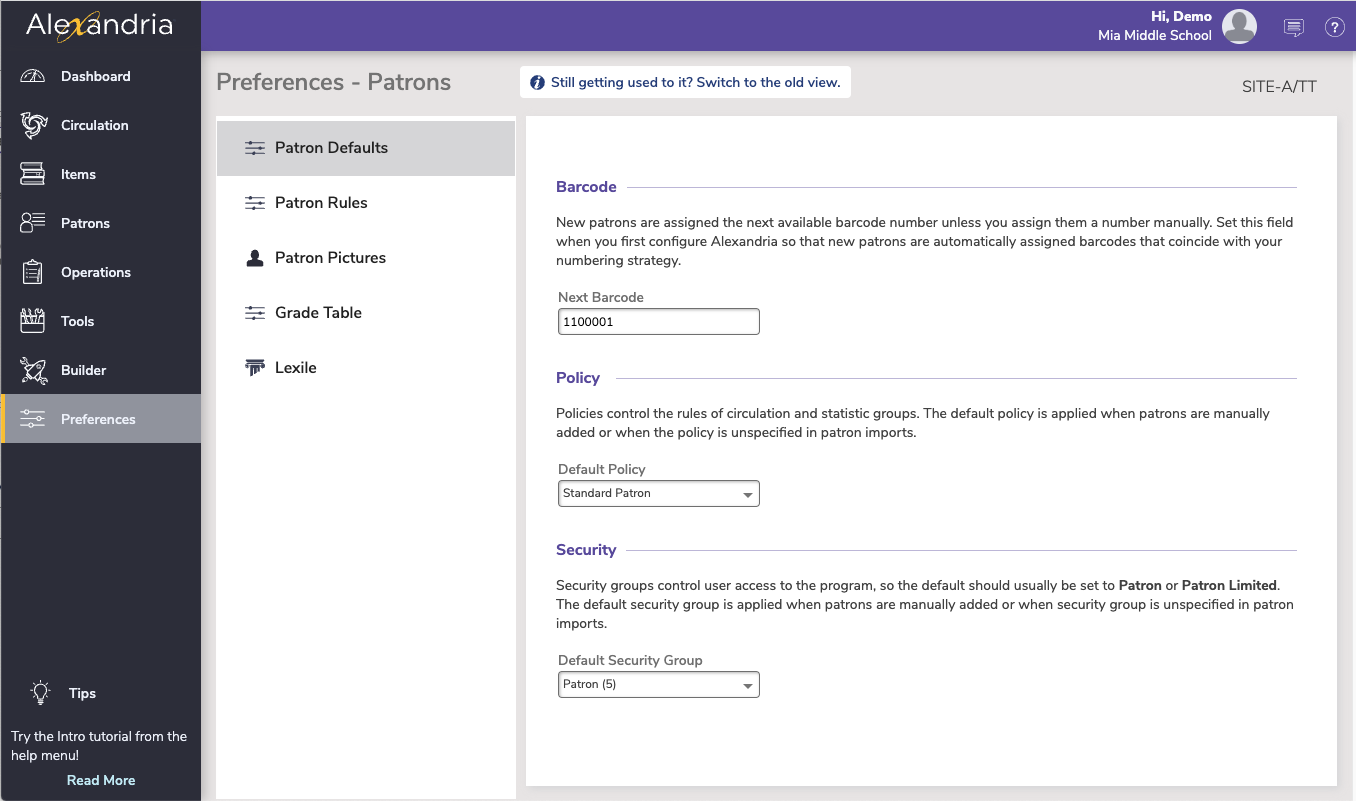 Image Added Image Added
Barcode- Next Barcode. New patrons are assigned the next available barcode number, unless you assign them a number manually. Setting this field when you first configure Alexandria will ensure new patrons are assigned barcodes that coincide with your numbering strategy. The code will increment automatically as new users are created.
Policy- Default Policy. Select the default patron policy to use for new patrons. If a user-created patron policy is selected and later removed from your Policies, this preference will revert back to Standard Patron. Review the Policy page for more information about implementing policies for patrons and items.
Security- Default Security Group. Select the security group you want applied to new patrons by default; ordinarily, this should always be set to Patron or Patron Limited. Review the Security section in Tools for more information about assigning (and removing) access levels for patrons and operators.
| Include Content |
|---|
| | render-without-blocks | true |
|---|
| block-names | Preferences |
|---|
| page | Patron Defaults |
|---|
retain-block-width | true
| Content Block |
|---|
| name | Patron PicturesRules |
|---|
| id | 58104596 | 1677645421 |
|---|
| 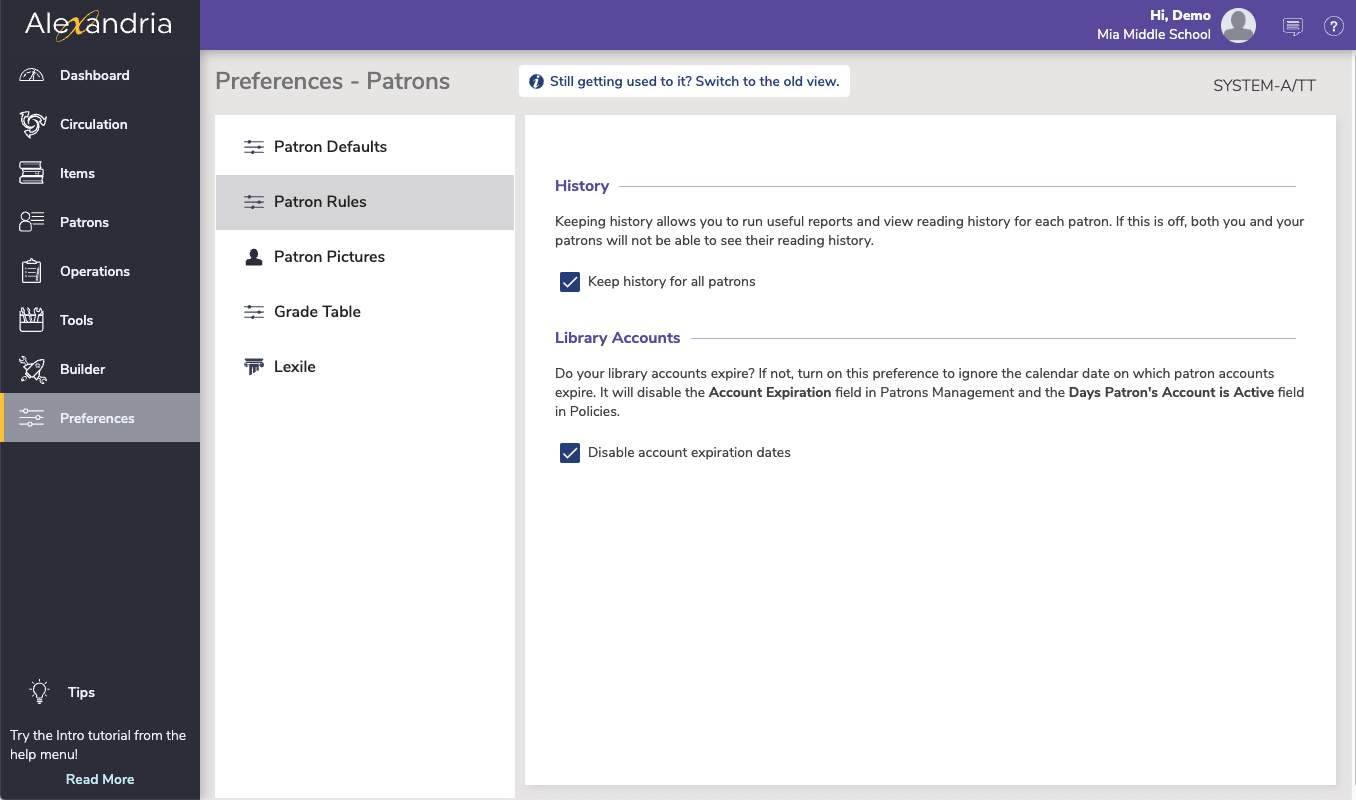 Image Added Image Added
HistoryKeep history for all patrons. When checked, a complete transaction history will be kept for all the patrons who are added to your library system. This includes the reading history that patrons can see by logging in to Status. Library AccountsDisable account expiration dates. Ignores the calendar date when patron accounts expire, and disables the Account Expiration field in Patrons Management and the Days Patron's Account is Active field in Policies. |
| Content Block |
|---|
| name | Patron Pictures |
|---|
| id | 1677649107 |
|---|
| You can apply generic Male, Female, or Unspecified images to patrons if they don't have an individual profile picture attached to their record on the Personal tab of Patrons Management; pictures are assigned based on the gender value selected for each patron. You can affix nearly any image supported by your browser (commonly accepted formats are JPEG, GIF, PNG, or BMP) into one of the three gender-based patron picture fields. If you don't have individual patron portraits assigned on the Personal tab of Patrons Management, these pictures will be used instead. Optimal image size for patron pictures is 155 pixels wide by 200 high. 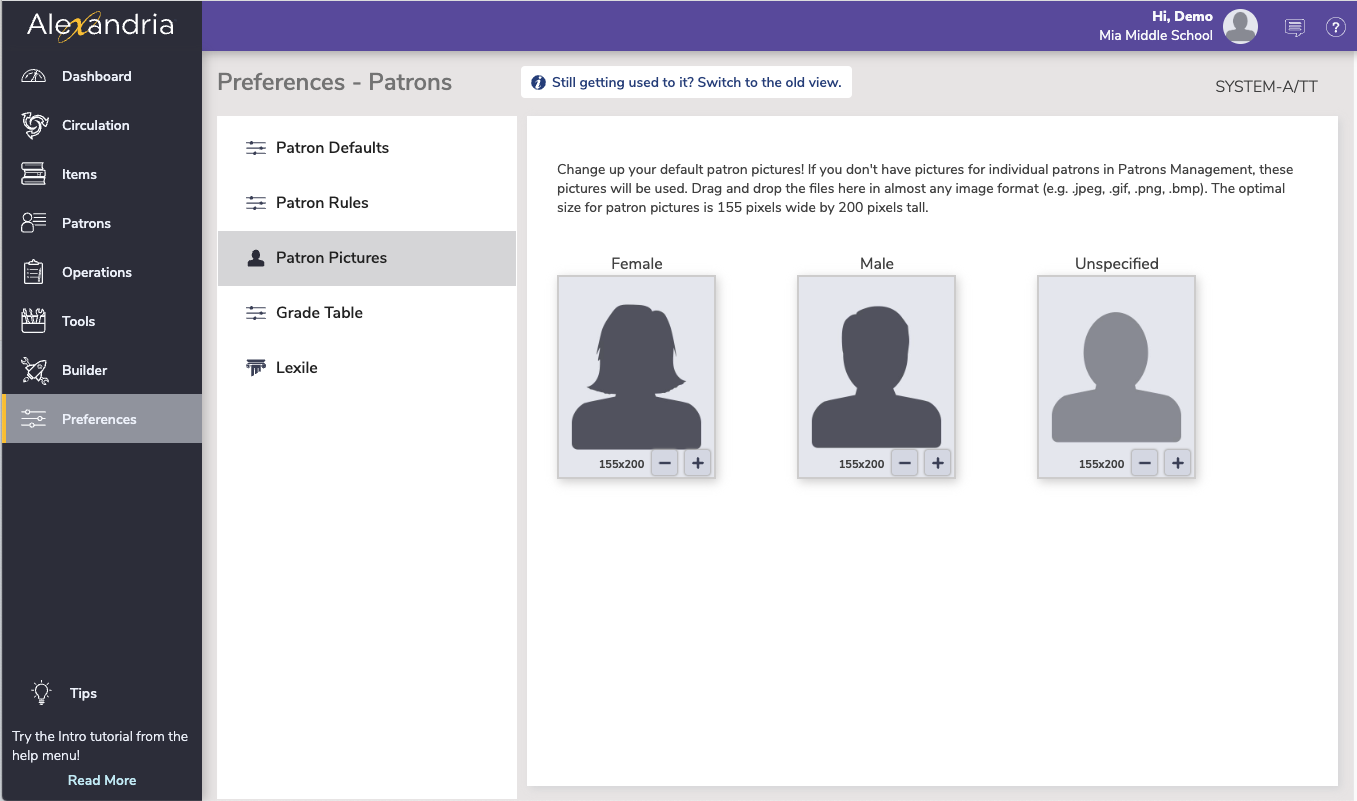 Image Added Image Added
| Include Content |
|---|
| | render-without-blocks | true |
|---|
| block-names | Preferences |
|---|
| page | Patron Pictures |
|---|
retain-block-width | true
| Content Block |
|---|
| name | Grade Table |
|---|
| id | 581147611677685660 |
|---|
|  Image Removed Tools > Preferences > Patrons > Grade Table tab Image Removed Tools > Preferences > Patrons > Grade Table tab
Grades (or, "Levels") in Alexandria can be used to search and sort patrons, run reports and utilities by specific grades, and more. | Tip |
|---|
Note that the Grade Table is where you keep all official grades. Patrons can still be imported/added with other grade terms (e.g. "2nd Grade" instead of "2"), and you'll want to periodically review Authority Control to clean up the grades. |
Here in the Grade Table, enter the grade levels relevant to your district Individually enter each grade level relevant to your union in the order they should be sorted and incremented. This is a simple list; the The first entry in the Grade Table will be your first grade level, the second will be the next grade level, etc. The Grade and Description entries in the table are fully customizable, allowing you to use whatever terminology you desire. Grades must be advanced manually at the end of each school year by using the Advance All Grades all grades now button or the Advance Patron Level Gradeutility. Using one of these utilities, you can advance your patrons to the next grade level until they reach the Last Grade level (e.g. Graduated); patrons will never advance past the Last Grade level.  Image Removed Image Removed
| Tip |
|---|
Users often set up their Policies to match Grades—remember to update your patrons' policies when you advance grades! |
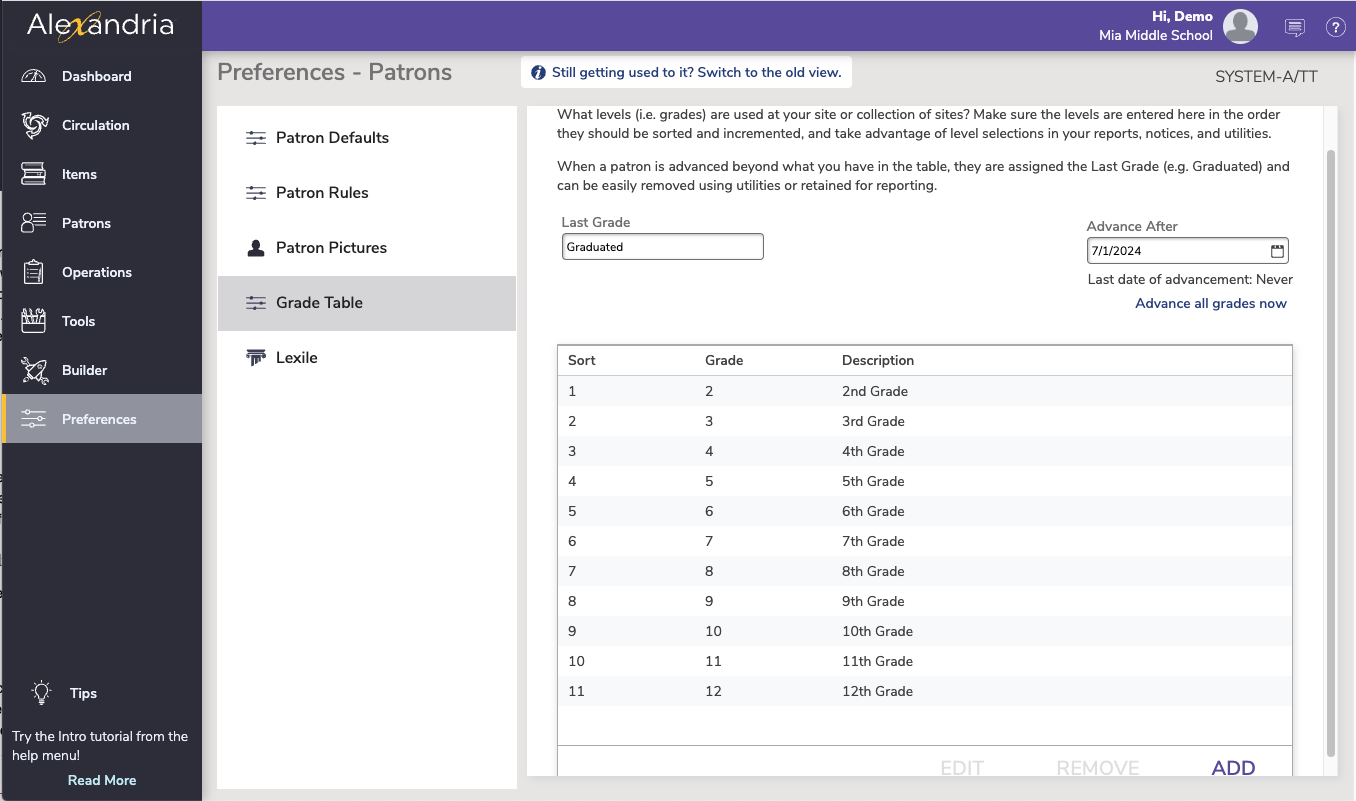 Image Added Image Added
SettingsLast Grade.This user-defined field defines your patron's highest (and final) level of advancement. This level will be assigned to patrons who go beyond the levels defined in the Grade Table. Patrons will not be advanced out of this level when grades are advanced. Default is Graduated and the field must contain a value—it cannot be left blank. Advance AfterThe Advance Grade After . This value is used to compute the projected graduation date when importing StudentPersonal objects using SIF. Never rearrange the grade table if you are importing with SIF. Changing the Advance Grade After (usually graduation date) does not advance a Grade; changing a Grade does not change the graduation date.date (set manually) after which grades will be automatically advanced. To avoid automatically advancing grades, set the date to a year in the past. Beneath you can see Last Date of Grade Advancement. This non-editable field shows when the latest Advance All Grades operation was performed ; the date is updated after the utility has completed.Advance All Grades. Each time this is clicked, you essentially on the account. You can also click on "Advance all grades now" to pull up a dialog that will allow you to choose which sites are advancing.  Image Added Image Added
Advance all grades nowClick this to add one grade level to each of your patrons until they reach the Last Grade level (described above). To elucidate, each patron in your database that has been applied a level that you defined in your Grade Table will have their level transitioned to the next grade in the tablethat already has a grade level (from the grade table). Any patron of the last level in your table will then advance to the 'last grade' value as described above. For example, a patron with the grade level of 6 will advance to 7. COMPanion recommends that you perform an Archive before using the Advance All Grades button. Patrons whose grade/level is either not found or not defined in the Grade Table will not have their grade level advanced. | Warning |
|---|
Advance All Grades Troubleshooting For the Advance All Grades utility to work, grades in the Grade Table need to exactly match the Grade field entry in the Patron Management record for the Advance All Grades utility to work. Often, the grades defined in the patron record are mistakenly padded with “0”s which causes the Advance Grade Utility to fail.records. Examples include: Patron record grades padded with “0”s.
A grade field using “5th” Another example of an error-causing incongruence would be a patron with “5th” in the Grade field of their patron record when “5” is the standard defined in the Grade Table preferences. |
Step-by-Step InstructionsAdd a New Grade Level| Multiexcerpt include |
|---|
| MultiExcerptName | Add a New Grade Level |
|---|
| PageWithExcerpt | ALIB:Alex Steps Preferences |
|---|
|
Remove a Grade Level| Multiexcerpt include |
|---|
| MultiExcerptName | Remove a Grade Level |
|---|
| PageWithExcerpt | ALIB:Alex Steps Preferences |
|---|
|
Edit a Grade Level| Multiexcerpt include |
|---|
| MultiExcerptName | Edit a Grade Level |
|---|
| PageWithExcerpt | ALIB:Alex Steps Preferences |
|---|
|
Back to Top- Click Add to add a new level to the grade table. In the dialog, enter the following information:
- Sort. Enter the sort order for the grade.
- The sort value you provide changes where the grade appears in the Grade Table and how grades are advanced.
- For example, if the earliest grade level you support is kindergarten, then “1” should be your Kindergarten Sort value. If, at a future date, you incorporate a new preschool level and that becomes your new “1”, then your Kindergarten Sort value will be automatically bumped to “2”.
- Grade. Enter a simple grade name.
- This title will be added to the Grade drop-down menu in Patrons Management, Patron Details, Patron Reports, etc.
- Description. This is a more common or explanatory version of the grade name.
- For example, your description for grade “7” could be “7th Grade”.
- Click Save to close the dialog.
- Finally, click Save to keep your new grade level or Revert to discard it.
|
| Content Block |
|---|
| name | Lexile |
|---|
| id | 58125137 | 1677711837 |
|---|
| Patron Lexile PreferencesLexile values are used to track your patron's reading progress as they move from kindergarten through high school. For more information on the importance and increasing performance of lexile scoring, Learn more about patron Lexiles. 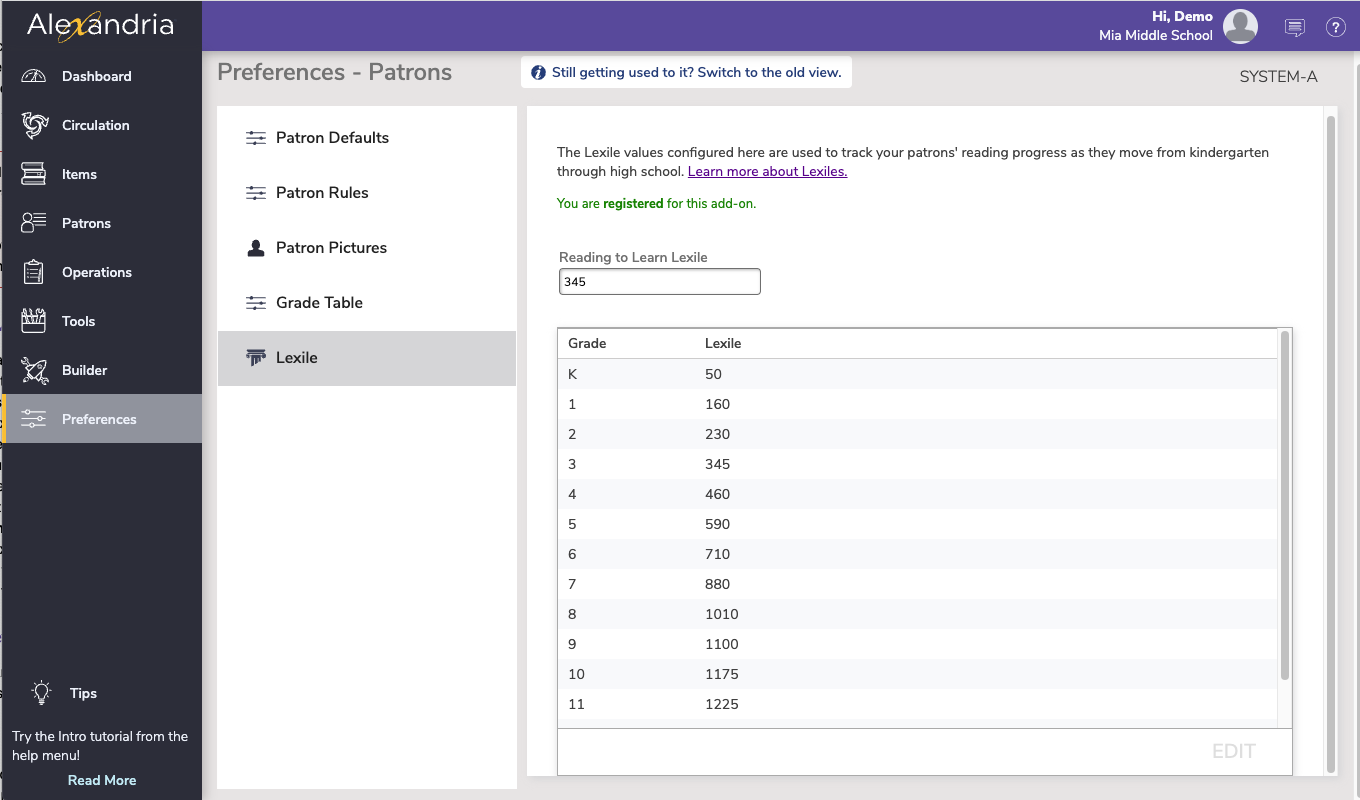 Image Added Image Added
Settings- Reading to Learn Lexile. The lexile value at which a patron has moved from Learning to Read to Reading to Learn. The transition from Learning to Read to Reading to Learn usually occurs between the third and fourth grade; therefore, the default Reading to Learn Lexile value is commonly set somewhere between 345 and 460. This value shows on the patron Lexile graph.
| Include Content |
|---|
| | render-without-blocks | true |
|---|
| block-names | Preferences |
|---|
| page | Patron Lexile Preferences |
|---|
retain-block-width | true
|
|